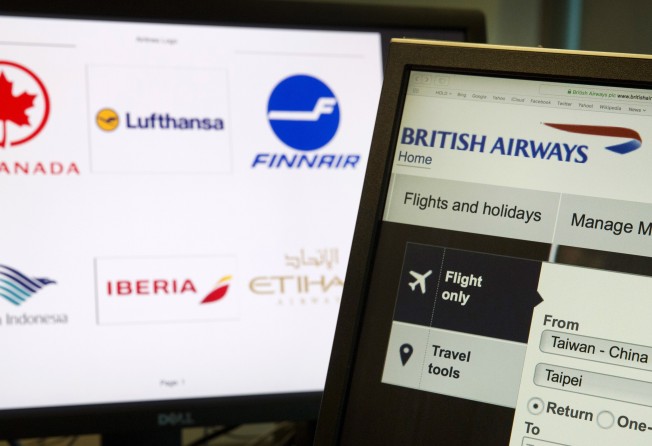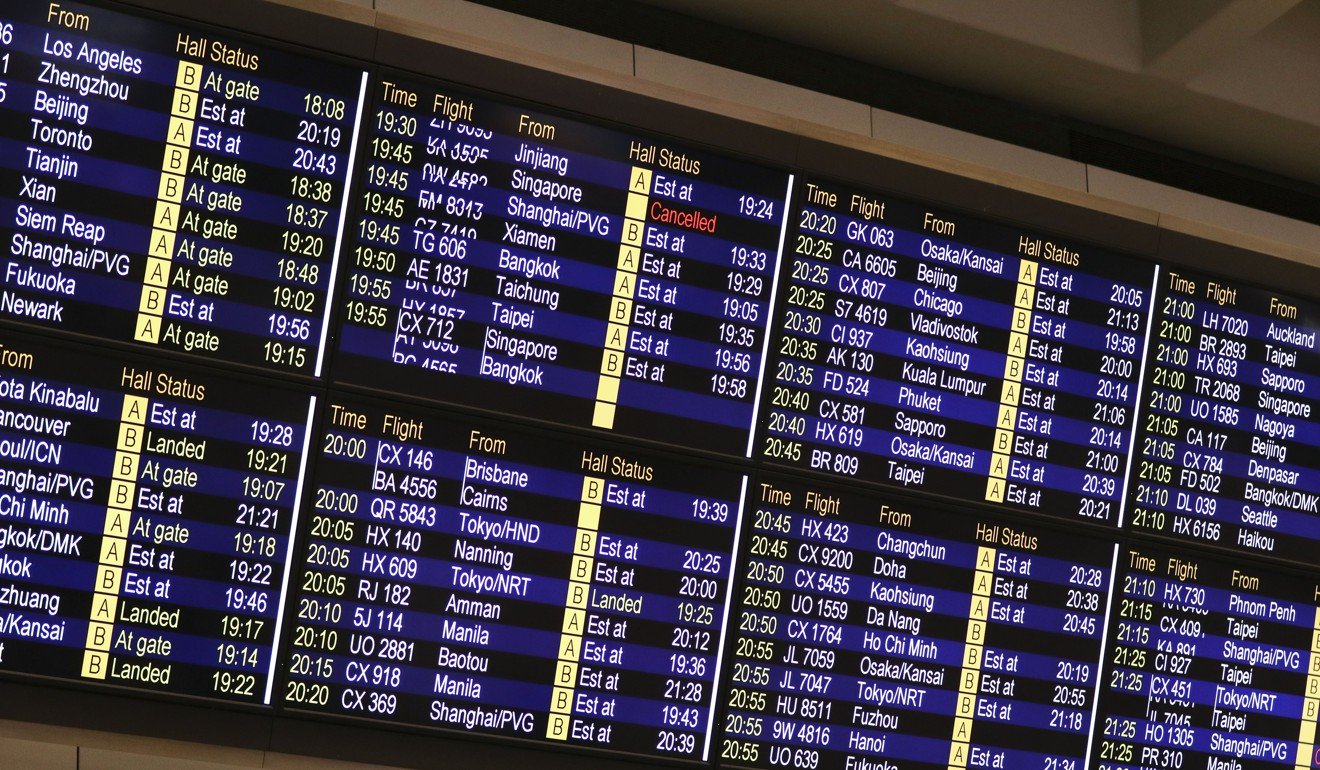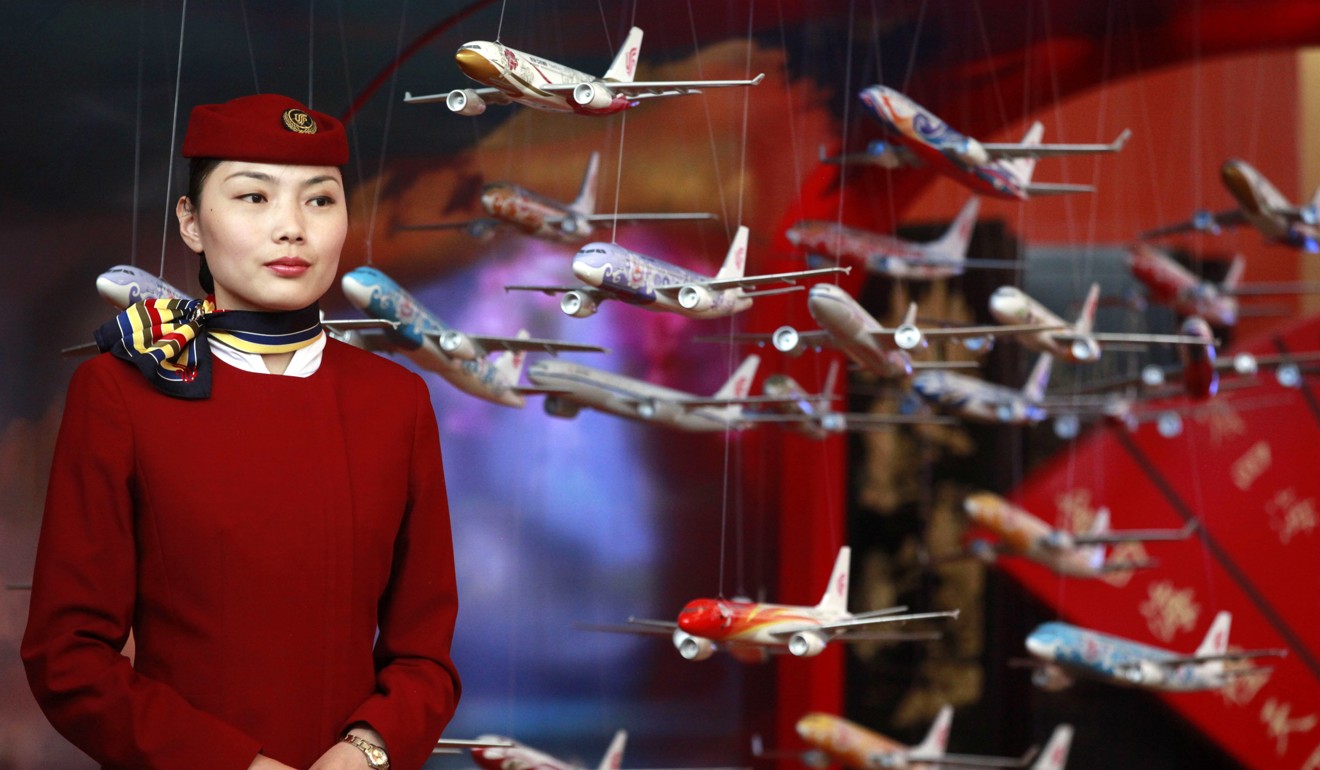Mainland Chinese media names and shames foreign airlines that refuse to comply with ‘Orwellian’ Taiwan demands
State-run newspaper posts ‘black hoarding’ of carriers that have yet to list the self-ruled island as part of China on their websites

China’s mainland media has joined in the fanfare to pressure overseas airlines to identify Taiwan, Hong Kong and Macau as being part of the same country.
Washington has described Beijing’s push to force foreign airlines to comply with its standards by Friday as “Orwellian nonsense”, but the government is adamant that the foreign airliners must respect China’s “territorial integrity and sovereignty, its laws and the feelings of the Chinese people”.
Aviation analysts said that even though the demand is a political one, airlines were likely to comply because of the size of the Chinese market.
Global Times, a nationalist tabloid owned by the party mouthpiece People’s Daily, named and shamed the major overseas airlines still holding out in a social media posting on Wednesday.
“The deadline is approaching and these overseas airlines are still resisting,” one article posted on its WeChat feed said.
The article has been viewed by more than 50,000 WeChat users and widely circulated by other news outlets, including the website of the overseas edition of People’s Daily.
Foreign airlines have been ordered to respect China’s territorial claims and not give the impression that Taiwan, Hong Kong and Macau are independent territories in a letter sent to 36 foreign carriers by the Civil Aviation Administration of China last month.
Media reports said those companies had been given 30 days to comply, adding that those who failed to acknowledge the one-China principle may be subjected to closer administrative scrutiny or even given demerits on their credit records.
As the reported deadline of May 25 approached, Global Times made a “red hoarding”, listing 23 airlines that have made the change as requested, and a “black hoarding” with 15 airlines that have yet to comply.
It identified several US airlines, including United and Delta, as well as the Australian carrier Qantas, as being among those that had not yet made the change.
The American Airlines website was criticised for not listing airports in Taiwan as belonging to China and not identifying Hong Kong and Macau as part of the country.
Shannon Gilson, a spokeswoman for American Airlines, said the company had received a letter and was reviewing it, but declined to comment further.
A spokesman for the Dubai-based carrier Emirates said: “Emirates has received a notice from the Chinese authorities and is currently conducting an internal review to ensure compliance with Chinese regulations”.
A spokeswoman for Qantas said: “We made adjustments to our websites earlier this year and, along with various other airlines worldwide, have been given additional time to further clarify how we refer to Chinese territories.”

The South China Morning Post contacted the other airlines but did not received replies.
China’s Ministry of Foreign Affairs and the Civil Aviation Administration of China are also yet to respond.
Several other carriers – including British Airways and Lufthansa – have made the requested changes and are featured on the newspaper’s “red hoarding”.
Air Canada issued a statement saying: “Air Canada’s policy is to comply with all legal requirements in all jurisdictions to which we fly. As a business enterprise, we are not expressing a political point of view, but meeting the requirements of various governments and stakeholders to ensure compliance with all applicable laws.
“Air Canada is only one of numerous major international airlines and other global corporations who have had to adopt their business practices in order to conduct business in Asia.”
China has spent years trying to isolate Taiwan diplomatically. It has never renounced its claim to the self-ruled island, where the defeated Nationalist forces fled in 1949 following the Communist victory in the civil war, and it is still a sensitive subject on the mainland.
In January, the US hotel giant Marriott was forced to apologise for sending out a questionnaire to customers that listed Taiwan, Macau, Hong Kong and Tibet as countries.
The incident triggered a hunt by internet users for similar “offences,” and Delta Air Lines, the fashion chain Zara and medical equipment maker Medtronic all subsequently apologised for referring to Taiwan as a country.
Henri Hie, a former executive at Air France and now an aviation professor at Hong Kong’s Polytechnic University, said, “For me, it’s a political problem only.”
However he warned that those that disagreed with China’s stance could see reduced traffic rights and fewer flights in mainland China.

“The airlines are politically insensitive for putting Taiwan separately,” Albert Lam Kwong-yu, Hong Kong’s former top aviation official, said.
Lam, who has plenty of experience dealing with his mainland Chinese counterparts, added, “I wouldn’t want to guess how Beijing might react.”
Lam, the director general of the city’s Civil Aviation Department between 1998 and 2004, added: “Taiwan is a relatively small market compared with the relative size of the mainland. Airlines are in it to do business, ultimately.
“They are not running a charity. They are there to make money. The mainland market is so big, the Taiwan market is so small.”
Corrine Png, chief executive of transport research firm Crucial Perspective, agreed. “The size of the Chinese international air traffic market is four times the size of Taiwan,” she said.
“For most carriers, their China routes are much more important revenue contributors and higher growth markets compared to Taiwan so it makes commercial sense for them to comply, even if it offends Taiwan.”
Png said there was little Taiwan could do about Beijing’s ultimatum. “Even for the Taiwanese airlines [EVA Airways and China Airlines], China routes are important and contribute around 10 per cent of their passenger revenue. ”